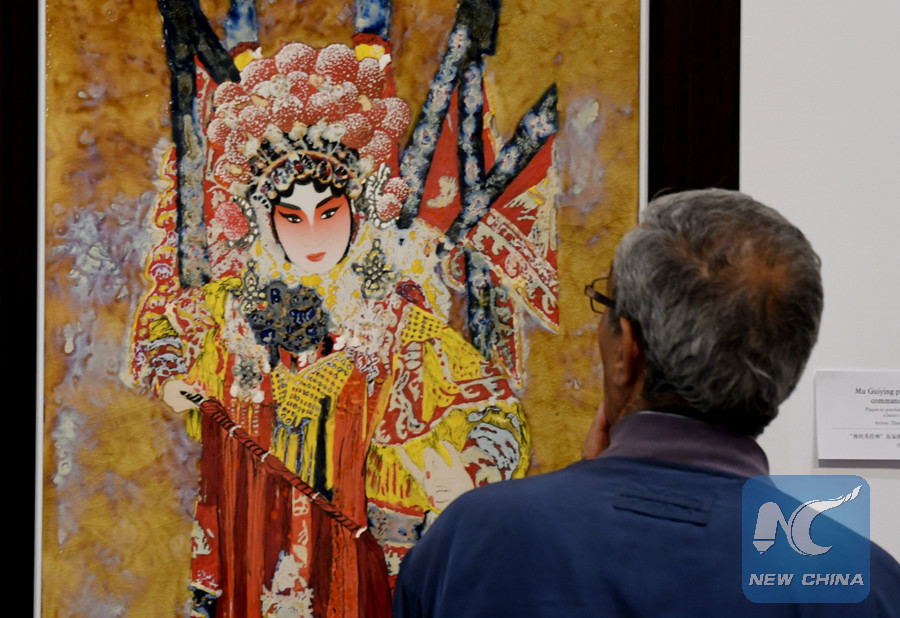
A visitor watches a porcelain artwork at Chinese Porcelain Art Exhibition in Tunis on May 17, 2018. (Xinhua)
TUNIS, May 17 (Xinhua) -- "It is called 'Nian Nian You Yu' in Chinese," Nassaem Mabrouk, a 19-year-old Tunisian college student, was taking photos of a blue-and-white porcelain vase at an ongoing Chinese porcelain art exhibition in Tunis, capital of Tunisia.
"In China, fish decorations always represent prosperity of the year. I am fascinated with Chinese culture, and this is my first time to closely view Chinese porcelain arts," said the girl, who majors in Chinese, excitedly. "I love these artworks. They are so beautiful."
The Chinese Porcelain Art Exhibition in Tunis, with the theme of "Chinese Porcelain, Chinese dream," mainly displays the porcelain culture of Jingdezhen, a town famous for porcelain art in the southeastern province of Jiangxi.
Jingdezhen has a long history of producing porcelain. In the Song Dynasty (960-1,279), potters in Jingdezhen created true porcelain by adding the mineral kaolin to China-stone and cranking the kiln temperature above 1,300 degrees Celsius.
Jingdezhen became famous for its production of blue-and-white porcelain wares, among the most precious and desirable objects in the world.
Porcelain made there is praised as "white as jade, thin as paper, with the sound of a bell and bright as a mirror."
Surrounded by the music performed by porcelain instruments, Tunisian visitors can closely enjoy the 46 pieces of porcelain works created by traditional and contemporary artists.
"This exhibition stresses typical Chinese features. Chinese profound culture, vivid folk stories, beautiful landscape, are all shaped in this fine porcelain art," said Tahar Dhaoui, a 43-year-old Tunisian artist.
"No matter traditional or modern, they depict different porcelain production techniques, so attractive." said Dhaoui.
Chinese Ambassador to Tunisia Wang Wenbin said Chinese porcelain possesses high aesthetic and cultural value. "This exhibition helps Tunisian people better understand Chinese culture."
The six-day exhibition, organized by China Federation of Literary and Art circles, Tunisian Culture Ministry and Chinese Embassy in Tunisia, will be held until May 21.
Tunisian Culture Minister Mohamed Zine El-Abidine highly praised Chinese porcelain art. "It has vivid forms and profound connotation," said El-Abidine. "This exhibition will help deepen and promote cultural exchanges between China and Tunisia."
Li Yi, the vice president of China Federation of Literary and Art circles, said porcelain art is considered as one important symbol of Chinese culture. "This porcelain exhibition will strengthen the cooperation between Chinese and Tunisian artists."
"Each year, craftsmen from all over the world gather in Jingdezhen, communicate and learn from each other in porcelain art," Li said. "Chinese porcelain witnesses the cultural friendship between China and the world."
"Porcelain was once an important commodity along the ancient silk road," said Li. "Nowadays, it still plays a positive role in promoting cultural exchanges, help develop bilateral friendship between different peoples."

